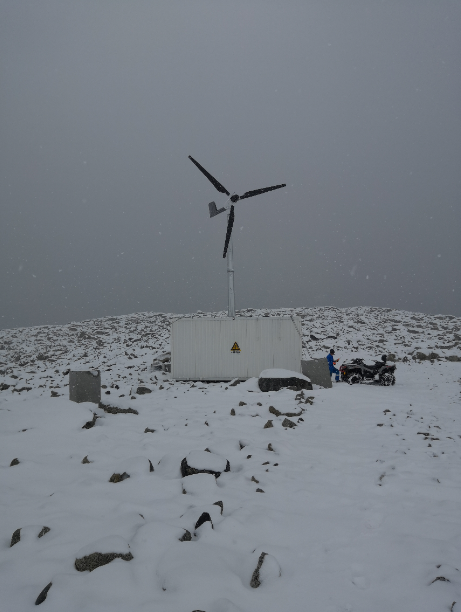
Anhua Pitch Controlled Wind Turbines Contribute Power to The Antarctic Taishan Scientific Research Station
After about 1 month’s installation, debug and test running, the wind, solar and diesel hybrid micro grid power supply system started working as Antarctic Taishan Scientific Research Station(Hereafter as Taishan Station) in February 1st, 2019. When the Scientific research team come back to China, the system is still working to supply power for the scientific research equipment!
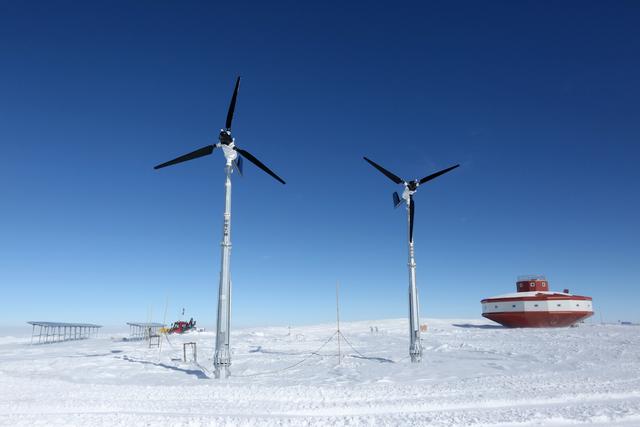
The China Antarctic Pole Scientific research station is the forth station after Great wall Station, Zhongshan Station and Kunlun Station. It starts the service from February 8th, 2014, mainly undertaking the task of relay between Zhongshan and Kunlun Station, supplying the support to research for antarctic pole land grove hill at the same time. It locates at the land of “Princess Elizabeth “ , about 520km from Zhongshan station and 600km far away of Kunlun station. It is a great inland S-R station, the action mainly be operated at summer, no guard in winter.
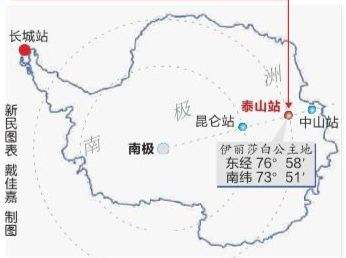
The annual average temperature is -25 degree, the average temperature in the inland plateau is -56 degree, and the extreme minimum temperature has reached -89.8 degree in Antarctica; The average thickness of the ice layer is 1880 meters, and the thickest is more than 4,000 meters. Taishan Station has a typical inland climate, with strong winds, severe snow blowing and extremely harsh climate: the altitude is 2621 meters, the annual average temperature is -36.6 degree, the lowest temperature is -64 degree, the highest temperature is -8 degree. The annual average wind speed : 6.5m/s, the maximum wind speed is over 60m/s
In such a bad weather, the sufficient energy supply for scientific research stations and scientific research workers is the must things in here. For a long time, Antarctic inspections relied on fuel as a guarantee. Each station is equipped with multiple diesel generator sets to realize the working and maintenance by order. This ensures the uninterrupted power supply @ 24/7 throughout the year.
Many countries have been studying the history of Antarctic science for more than 100 years. At present, there are 20 countries that have established more than 150 scientific research stations in Antarctica. There are currently 5 scientific research stations from China. According to the information provided by the China Polar Research Center, Great Wall Station and Zhongshan Station need about 350 tons of high-standard diesel per year at least, and a small amount of gasoline and liquefied gas. The inland inspection team and the Kunlun (construction in 2008~2009) were equipped with 160 tons of aviation kerosene. These fuels are mainly used for power generation, heating, transportation machinery, etc. The diesel used in the Antarctic must be purchased by Hobart, because a few kilometers away from the tanker and the cost of transportation, the number of shipments is limited. With the development of science and technology and the awareness of human beings on environmental protection, more and more countries have proposed new energy research stations in Antarctica.

Due to the high noise of diesel power generation and its unfavorable environmental protection, it is easy to pollute the extremely vulnerable and sensitive Antarctic region. Therefore, the promotion of the application of green energy in Antarctica is extremely urgent and with great significance. Following up the advancement and development of new energy technologies, the “wind” and “solar” in Antarctica began to be considered by the scientific research workers.
In order to get rid of the dependence on conventional energy, build an effective new energy utilization mechanism to help the development of the scientific research in the polar regions. China's Antarctic research station has been trying new energy applications for many years. Therefore, at the beginning of the construction of the station in Taishan Station, the China Polar Center has established a significant reduction in fuel consumption, adapted to local conditions, increased the proportion of clean energy applications, realizing energy on-site materials, recycling, and creating an automated, intelligent green power supply system. It became a demonstration station for high-tech and environmental protection in the Antarctic research station.
In the Antarctic area, especially in the area of Taishan Station, the sun and wind speed condition are very sufficient. So to integrate the photovoltaic power, wind power, the diesel power etc to build a multi-energy complementary intelligent microgrid power generation system is the best solution. The power provided by the photovoltaic power generation system and the wind power generation system can fully meet the power demand of the electrical load in the scientific research station under normal conditions (including during the night), and the excess electrical energy can also be stored in the energy storage system as a backup power source. In extreme cases, when the power generation of the new energy supply system or the energy storage system is insufficient, the diesel generator will be automatically activated. When the new energy generation system meets the power supply condition, it will automatically be switched to the new energy system again and shut down the diesel generator sets. Due to the intelligent management, the energy supply is timely allocated to ensure that the scientific observation equipment of the station can obtain safe, stable and reliable energy protection at any time and under any circumstances.
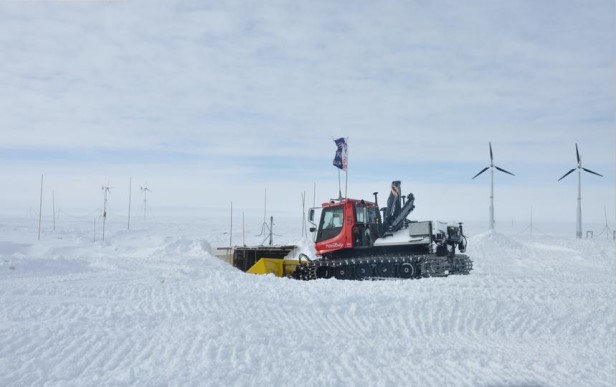
The Antarctic continent is known as the "wind pole" of the earth and it contains a large amount of renewable energy. Following with the progress and development of new energy technologies, the "wind" and "sun" have begun to become the new "power source" in here. In order to use as much wind and light as possible, some scientific research stations have used the new energy source to provide electricity for the scientific research station, such as the new Princess Elizabeth from Belgium and the Mawson station from Australia. Wind power plays an important role in extreme environments in this kind of system and project, how to ensure the stable and reliable of wind power power in Antarctic? .
As per the above information, because of the special environment such as extreme cold, high wind, high altitude, low pressure and strong ultraviolet radiation in Anshan Taishan Station, to find the best small wind turbine which can be resisted the harsh climate and easy installation and maintenance become the top priority of the Polar Center New Energy Project Team. . More than one year’s working, the project team visited dozens of large and medium-sized wind turbine manufacturers to move forward this job. After the strict demonstration, our pitch controlled wind turbine became the only option. After the cooperation was finalized, under the encouragement of the national interests and the spirit of glory for the country, all the technicians of Qingdao Anhua New Energy worked hard and overtime; consulted a large number of documents; consulted more than a dozen materials experts of the institute etc. 6 months later, the key problem was solved by ANE, and all the low temperature technical difficulties were successfully solved, and the wind power system was delivered on time and within the promised delivery time.
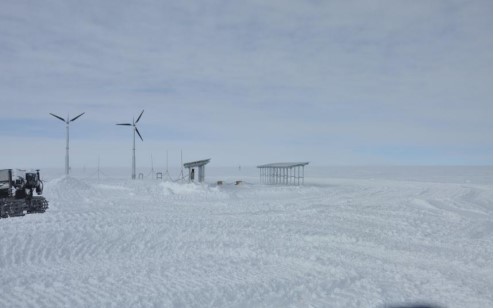
This micro grid power supply system which located at the Antarctic Taishan Station is currently working stably in good operation. After the 35th Antarctic expedition team left Taishan Station to back to China, the system continues to supply power to scientific research equipment in Taishan Station. User and we also can check and monitor the system’s working status by our remote monitor system, In the later stage, with the increase of the electric load, it is easy to increase the power supply by incorporating more wind turbines, to ensure fully satisfy the demand for electricity.
With the smooth implementation of this multi-energy complementary micro grid project, the energy utilization of the Chinese Antarctic expedition will become more green, efficient and sustainable. At present, our wind turbines have taken root in the Antarctic Taishan Station and the Ross Sea New Station. We sincerely hope that our wind turbines will send more green energy to the beautiful mysterious South Pole!
